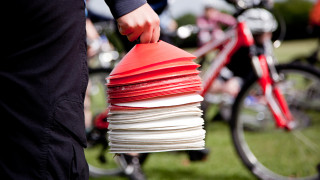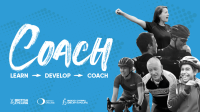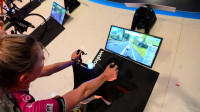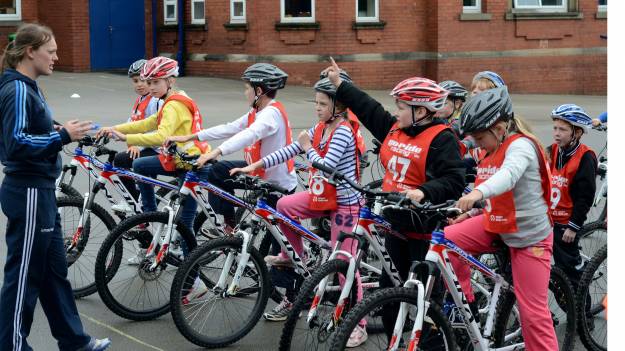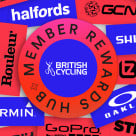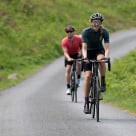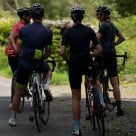Frances Newstead was one of the first British Cycling coaches - qualifying back in 2004 - and is now a Level 3 Road and Time Trial Coach.
She’s very active both with groups of riders and one-to-one prescription, having been a coach on the previous British Cycling Talent Pathway. Fran was also a successful international rider with success at world and national levels.
1. Fran, you’ve got your own Wikipedia page outlining a top racing career. What was the highlight?
I have fond memories of all my national medals but representing Team England at the 2002 Commonwealth Games has to be the highlight. I hadn’t competed at a multi-sport event before and the whole thing was a level up from what I had previously experienced. That included the preparation and backing from British Cycling, with mentoring from Chris Boardman for riders doing the time trial. And the amount of kit we received!
The whole event carried a buzz from start to finish; the opening ceremony, seeing athletes you’d only ever seen on television walking around the athlete’s village then eating in the main hall with them. The crowds and television coverage were also both significant - which at the time was quite unusual for a women’s cycling event.
2. You’ve seen the sport at every level. How have you seen it change for female riders over the years?
Parity between the men and women is improving, although there is still a lot to do at a professional level for female road riders.
On the road, success at international level has shown the strength of British female road riders but it has taken time for this to be recognised due to a lack of television coverage. The track success has brought more television coverage for cycling at major events such as the Olympics, which has helped to highlight the aggressive and exciting nature of women’s road racing. This in turn is helping to increase its popularity with the public and the demand to see more. Until there is more television coverage and more sponsors are drawn in, parity with wages and team budgets on the road will likely remain as it is.
At a domestic level, the women’s arm of the sport has certainly evolved. More riders and people involved in the sport have recognised the need to support female riders and taken it upon themselves to set up professional, semi-professional and development teams as well as dedicated women-specific training sessions. This is drawing more women into the sport and enabling riders to gain experience of international racing, much as the WCRA did back in the day but on a larger scale. Domestic racing is more competitive as a result, much as the Premier Calendar was a decade ago, which is helping to improve the standard, strength and depth of British road riders.
On a development level at British Cycling, the female junior riders have a dedicated ODP coach this year and this gives them the recognition and attention they need. The Performance Pathway now has a much more flexible approach, enabling riders who show talent to slot in to the appropriate level of coaching they need to prepare them for the Olympic programs whatever their age.
3. Tell us about your coaching. What types of riders do you coach and how have your female specific sessions been?
All types! Mainly amateur racing cyclists looking to raise their game with training set specifically for them but also young riders (and parents) who are looking for help with their development in the sport and getting on to the British Cycling Performance Pathway.
The idea of the women’s specific sessions came from British Cycling’s drive to encourage women into the sport but they were aimed at competition rather than simply participation. Huw Williams had set up something similar in London, providing race specific sessions and training advice to women wanting to start racing. They were based on sessions we did for boys and girls who were talent spotted for the British Cycling Talent Pathway – teaching them the tactics and techniques of racing. The whole scene has grown now and there are lots of similar opportunities based up and down the country, encouraging women to start racing.
4. You’ve worked with cycling legend Chris Boardman. How has that relationship influenced your coaching?
Chris worked in a very methodical and analytical way: everything was planned to the last letter so that at every stage of his training plan he knew why he was doing something, where his fitness should be and why. This motivated him and helped him stay focussed and it’s the way I like to work - I’m a planner! I try to learn from everything I do so I don’t make the same mistake twice. You finish an exercise, whatever it might be, and take time to stop and think what was good, what was bad.
Chris also taught me how to deal with stress by normalising situations, for example from a psychological perspective when preparing for a major event there would be a degree of anxiety and stress that felt horrible. Rather than try to find ways to prevent it I learnt to accept it, yes it is horrible and uncomfortable but it is what it is, accept it and get on with it. I have found this advice useful on many levels but particularly when working with young riders as a lot of their development is learning to deal with situations they haven’t encountered before.
He also believed that a lot of what we do is learnable and that it is your attitude that is important. Is success due to talent or your ability to work hard, apply yourself and have the right attitude?
5. How has your approach to coaching changed over the years?
I have become more adaptable. Coaching is very personal, very creative and I’ve learnt not to be afraid of changing my methods, trying new things to achieve an end aim. I’ve also learnt to match a rider’s psychological needs with their physiological needs. You can have physically the best training programme in the world, but if it is too much for a rider, then it’s useless.
6. Give us three top tips for other coaches.
- Find out from your rider what style of coaching motivates them - and be adaptable.
- Never assume anything or take anything for granted – check understanding.
- When prescribing sessions, relate efforts to real life situations within a race. This enables a rider to visualise why they are being asked to suffer and help them dig deeper.

